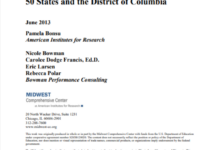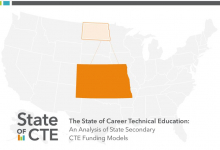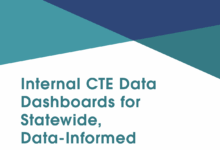To address the serious teacher shortage being experienced by districts across the state, the South Dakota State Board of Education changed administrative rules for Career Technical Education (CTE) teacher certification in November 2015, introducing more consistency and flexibility to the certification process. The previous system of certification for CTE teachers varied across the 16 Career Cluster® program areas, with different clusters requiring vastly differing levels of work experience and education coursework. To address this, the State Board convened a group of stakeholders that included postsecondary leaders, school administrators and teachers who had gone through the alternative CTE certification process to conduct a review of the certification process. The group proposed a framework of new rules that was consistent across clusters but still provided necessary flexibility to districts and schools. Until 2018, teachers can choose to receive certification under either the new rules or the previous rules.
Under the new rules, CTE teachers may receive certification at the Career Cluster or Career Pathway level. A career cluster endorsement requires teachers to pass a state certification exam or complete 15 credits of coursework and allows teachers to teach any course within a cluster, including all pathway-level courses. A career pathway endorsement requires teachers to pass the state certification exam, complete nine credits of coursework, or have 4,000 hours of work experience. With the pathway endorsement, teachers may teach any course within a career pathway, but must complete more coursework in order to earn an endorsement for an entire cluster.
For example, there are multiple pathways within the Human Services Career Cluster that are all fairly different from each other in practice. Under the new system, a person who has extensive work experience in the Early Childhood Development Career Pathway can receive an endorsement in that field and would be certified to teach any courses within that pathway. However, only an individual with a Human Service Career Cluster endorsement could teach in the Early Childhood Development and Counseling and Mental Health Services pathways. This allows specialists — including industry experts — to enter the classroom more quickly, but still protects the rigor of the other pathways by preventing people who do not have the work experience or have not completed the required coursework from getting a blanket endorsement.
In addition, all teachers must complete a CTE methods course, and those who enter a classroom by way of an alternative certification must participate in a mentored internship with a veteran teacher.
The CTE methods course is being piloted during the summer of 2016, and covers a wide array of topics relevant to CTE instructors, such as Career Technical Student Organization (CTSO) management, lab safety, advisory boards, CTE program management, academic integration, work-based learning and instructional best practices. Mentored internships will be rolled out in Spring 2017, and will include information related to classroom management, differentiated instruction, curriculum development and assessment. Both the CTE methods course and mentored internships are being developed by the State Department of Education in coordination with state institutions of higher education.
Policy in Action
Major pieces of these rule changes have not yet been rolled out, and the full impact of the changes will not be seen until 2018, when every new CTE teacher must use the new rules to receive certification.
These rule changes are being implemented in conjunction with other efforts to recruit more teachers generally in the state, most notably a pay raise passed in March 2016. The state will need to continue to explore innovations in teacher recruitment, while making sure they maintain the teaching standards required to properly prepare students for careers.
Related Links
- South Dakota Legislature Requirements for CTE Endorsement Programs
- South Dakota CTE Certification Rules FAQ
- South Dakota Department of Education Teacher Certification Process





